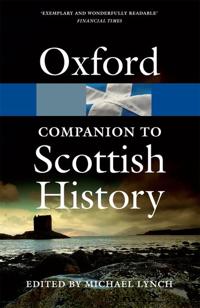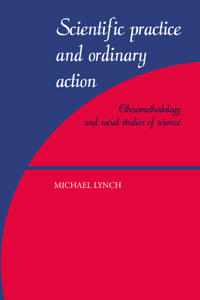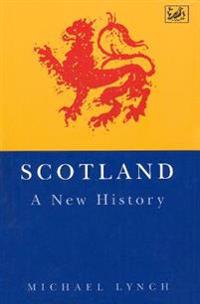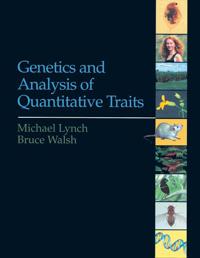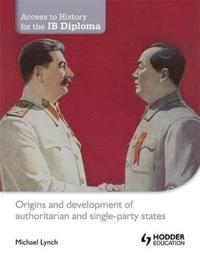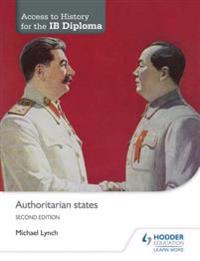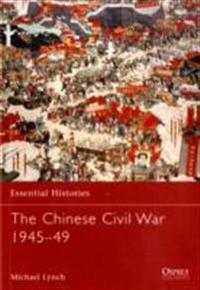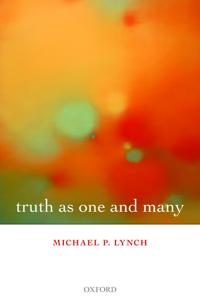The Oxford Companion to Scottish History (Pocket)
avMichael Lynch
ISBN: 9780199693054 - UTGIVEN: 201104The Oxford Companion to Scottish History interprets history broadly, including archaeology, architecture, climate, culture, folk belief, geology, and the langauages of Scotland. It covers more than 20 centuries of history, including immigrants, migrants, and emigrants. It extends from Orkney and She[...]
An Introduction To Modern British History, 1890-1990 (Pocket)
avMichael Lynch
ISBN: 9780340775257 - UTGIVEN: 2001-01-23Covering the political history, this title provides the issues affecting the economy, society, religion, culture and ideas. Assesses the main themes of modern British history, it explains issues such as politics, social and economic trends and foreign affairs. It offers an introductory analysis of v[...]
Reaction And Revolutions (Pocket)
avMichael Lynch
ISBN: 9780340885895 - UTGIVEN: 2005-05-15Provides both a narrative and analysis of the background, course and effects of the 1917 revolution. Beginning with an overview of Imperial Russia and the problems and challenges it faced, this book goes on to look at the growth of revolutionary movements which would eventually lead to the October R[...]
The People's Republic of China 1949-76 (Pocket)
avMichael Lynch
ISBN: 9780340929278 - UTGIVEN: 2008-09-01A second edition of this title, revised for the 2008 specifications, with a new accessible design, updated content and exam advice to allow all AS and A level students to develop the knowledge, understanding and study skills needed for exam success.[...]
Stalin's Russia, 1924-53 (Pocket)
avMichael Lynch
ISBN: 9780340965894 - UTGIVEN: 2008-08-04Revised and updated for the 2008 AQA and Edexcel AS specifications.
From Autocracy To Communism (Pocket)
avMichael Lynch
ISBN: 9780340965900 - UTGIVEN: 2008-06-27Revised and updated for the 2008 OCR AS specification.
Access to history. Britain 1900-51 (Pocket)
avMichael Lynch
ISBN: 9780340965948 - UTGIVEN: 2008-08-01A new title in the Access to History series, written specifically to cover the key content of the OCR and AQA 2008 specifications.[...]
Britain 1945-2007 (Pocket)
avMichael Lynch
ISBN: 9780340965955 - UTGIVEN: 2008-10-01This title charts the key changes in the social, political, and cultural development of Britain across this period. It looks at key individuals throughout these years, from Churchill and Wilson to Thatcher and Blair, assessing each of their periods in office and charting the rise and fall of politic[...]
Mao (Pocket)
avMichael Lynch
ISBN: 9780415215787 - UTGIVEN: 2003-12-01Was Mao Zedong the first red emperor or the last great Marxist leader? Held in awe by his people, he was seen by many as a supreme hero who had freed their country. Lynch presents an account of Mao's life and politics, making use of a wealth of primary and secondary sources, locating Maoism in the b[...]
Hitler (Pocket)
avMichael Lynch
ISBN: 9780415436465 - UTGIVEN: 2011-06-01Adolf Hitler is one of the most notorious political figure. This biography looks at Hitler's life from his childhood, his time as a drop out, his awakening as a revolutionary and his then relatively conventional ascent to power.[...]
Scientific Practice and Ordinary Action (Häftad)
avMichael Lynch
ISBN: 9780521597425 - UTGIVEN: 199708Philosophers, historians, and sociologists of science have grown interested in the daily practices of scientists. Recent studies have drawn linkages between scientific innovations and more ordinary procedures, craft skills, and sources of sponsorship. These studies dispute the idea that science is t[...]
Scotland (Häftad)
avMichael Lynch
ISBN: 9780712698931 - UTGIVEN: 199210This full-length history of Scotland spans 18 centuries, from the Picts to the 1980s. The book focuses on social and cultural history, including life in the towns, the changing role of the nobility and the shifting images of Scottish identity.[...]
Genetics and Analysis of Quantitative Traits (Inbunden)
avMichael Lynch, Bruce Walsh
ISBN: 9780878934812 - UTGIVEN: 199801The authors bring together a diverse array of theoretical and empirical applications of quantitative genetics in this comprehensive work designed to be accessible to anyone with a rudimentary understanding of statistics and genetics. Central concepts are developed from first principles and are illus[...]
The Origins of Genome Architecture (Inbunden)
avMichael Lynch
ISBN: 9780878934843 - UTGIVEN: 2007-06-01Presents an explanatory framework for how the architectural diversity of eukarotic genomes and genes came to arise. Presented in non-technical fashion, this work is suitable for use in an advanced Genetics course and as a professional reference.[...]
China (Pocket)
avMichael Lynch
ISBN: 9781444110128 - UTGIVEN: 2010-09-01This book combines a factual narrative with up-to-date analysis of the extraordinary events in China from 1900-29 and has been revised to ensure tailored coverage of the current AS and A2 units on this topic.[...]
Origins and Development of Authoritarian and Single-party States (Häftad)
avMichael Lynch
ISBN: 9781444156447 - UTGIVEN: 201303Ensure your students have access to the authoritative, in-depth and accessible content of this series for the IB History Diploma. This series for the IB History Diploma has taken the clarity, accessibility, reliability and in-depth analysis of our best-selling Access to History series and tailor-mad[...]
Authoritarian States (Pocket)
avMichael Lynch
ISBN: 9781471839306 - UTGIVEN: 2015-05The renowned IB Diploma History series, combining compelling narratives with academic rigor. A new edition for World History Topic 10: Authoritarian states (20th Century) An authoritative and engaging narrative, with the widest variety of sources at this level, helping students to develop their know[...]
The Chinese Civil War 1945-49 (Pocket)
avMichael Lynch
ISBN: 9781841766713 - UTGIVEN: 201005Out of the ashes of Imperial China arose two new contenders to lead a reformed nation; the Chinese Nationalist Party, the Kuomintang, and the Chinese Communist Party. In 1927, the inevitable clash between these two political parties led to a bitter civil war that would last for 23 years, through Wor[...]
The Treadmill of Crime (Pocket)
avPaul B Stretesky, Michael A Long, Michael J Lynch
ISBN: 9780415657365 - UTGIVEN: 2013-07-29Truth as One and Many (Häftad)
avMichael P. Lynch
ISBN: 9780199596300 - UTGIVEN: 2011-03What is truth? Michael Lynch defends a bold new answer to this question. Traditional theories of truth hold that truth has only a single uniform nature. All truths are true in the same way. More recent deflationary theories claim that truth has no nature at all; the concept of truth is of no real ph[...]
In Praise of Reason: Why Rationality Matters for Democracy (Övrig)
avMichael P. Lynch
ISBN: 9780262017220 - UTGIVEN: 2012-04-13Why does reason matter, if (as many people seem to think) in the end everything comes down to blind faith or gut instinct? Why not just go with what you believe even if it contradicts the evidence? Why bother with rational explanation when name-calling, manipulation, and force are so much more effec[...]
Truth in Context: An Essay on Pluralism and Objectivity (Inbunden)
avMichael P. Lynch
ISBN: 9780262122122 - UTGIVEN: 1999-01-11In Praise of Reason: Why Rationality Matters for Democracy (Pocket)
avMichael P. Lynch
ISBN: 9780262526050 - UTGIVEN: 2014-03-14Truth In Context (Pocket)
avMichael P. Lynch
ISBN: 9780262621557 - UTGIVEN: 2001-09-03Michael Lynch argues that there is a path where metaphysical pluralism is consistent with a robust realism about truth.[...]
True to Life (Pocket)
avMichael P. Lynch
ISBN: 9780262622011 - UTGIVEN: 2005-08-15Why does truth matter, when politicians so easily sidestep it and intellectuals scorn it as irrelevant? Why be concerned over an abstract idea like truth when something that isn't true - for example, a report of Iraq's attempting to buy materials for nuclear weapons - gets the desired result, the in[...]

